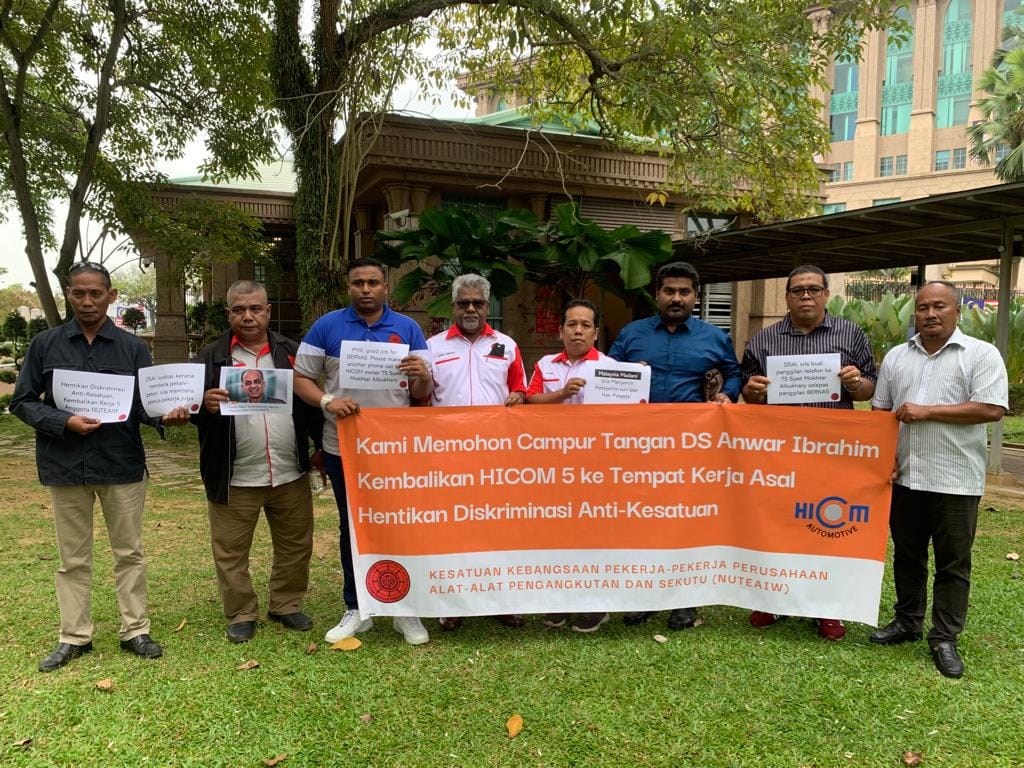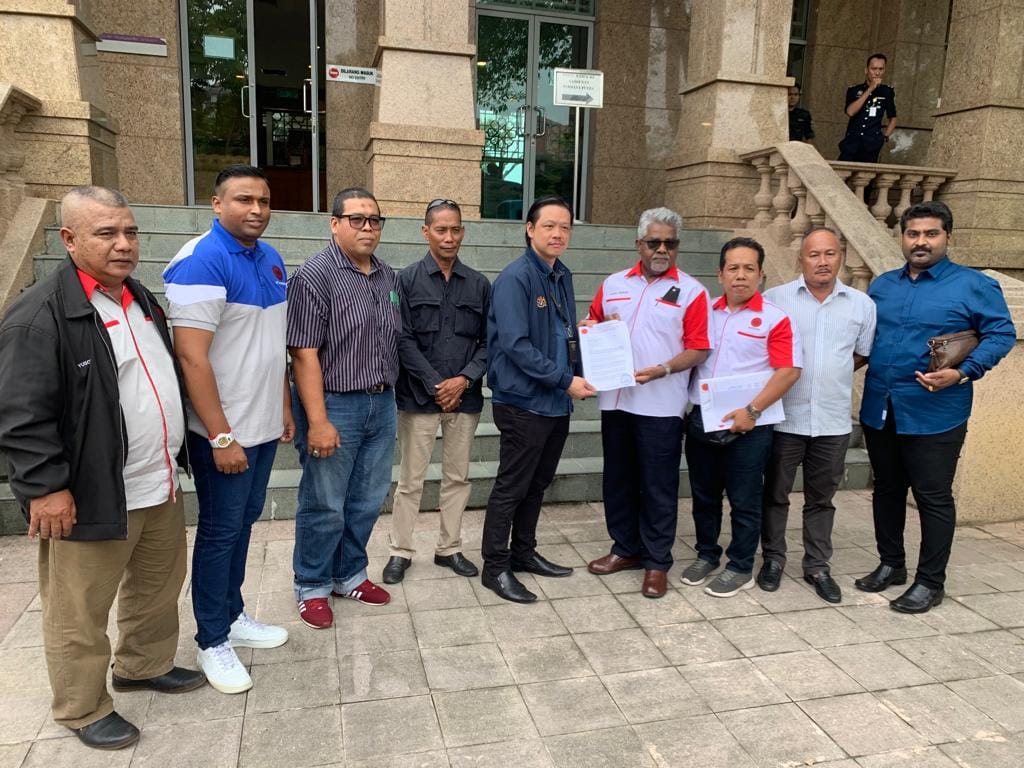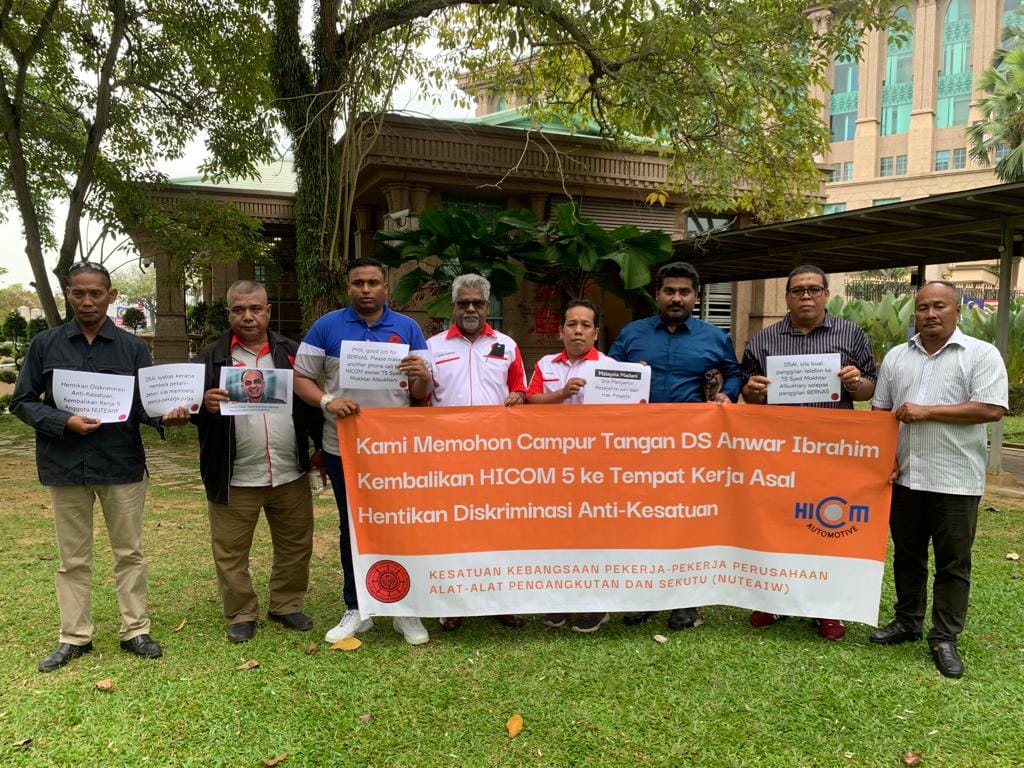NUTEAIW SUBMITS URGENT MEMORANDUM TO PRIME MINISTER'S POLITICAL SECRETARY AGAINST ANTI-UNION DISCRIMINATION AT HICOM AUTOMOTIVE (DATED: AUGUST 18, 2023)
On August 18, 2023,
NUTEAIW submitted a memorandum to the Prime Minister's political secretary, Chan Ming Kai, today, urging the PM to stop anti-union discrimination at HICOM Automotive and promptly reinstate 5 union members.
The National Union of Transport Equipment and Allied Industries Workers (NUTEAIW) has officially lodged a complaint with the Malaysian Department of Industrial Relations (JPP) to investigate anti-union discrimination at HICOM under Section 59 of the Industrial Relations Act.
On December 4, 2015, NUTEAIW held an off-duty briefing outside HICOM premises, near the parking area and facing Pekan and Kuantan Roads, Pahang. The purpose of the briefing was to update union members on the status of collective bargaining with HICOM. The previous collective agreement had expired on June 30, 2014. NUTEAIW had submitted its initial proposal to HICOM on April 1, 2014. Despite several negotiations between the union and HICOM, no agreement was reached. It is essential to note that during the briefing, the old collective agreement had already lapsed for 6 months, the employer did not negotiate in good faith, and the union had to inform its members of the progress in the negotiation process.
More than 110 union members gathered in the parking lot outside HICOM premises from 5:30 pm to 6:30 pm after working hours. The briefing proceeded smoothly and peacefully. Participants did not obstruct anyone from entering or leaving HICOM's entrance. After the briefing, HICOM issued show-cause letters to 32 NUTEAIW members employed at the HICOM plant. HICOM alleged that the 32 union members violated company policies and disciplinary procedures because the briefing "attracted public attention and created a negative perception of the company."
HICOM terminated all 32 union members' employment on February 5, 2016. After NUTEAIW filed a complaint with the JPP under Section 20 of the Industrial Relations Act, 27 union members were successfully reinstated by HICOM. However, HICOM refused to reinstate 5 workplace committee members—Muhamad Sukeri Bin Mahudin, Rozaimi Bin Mohammad, Mohamad Yusry Bin Othman, Haikhidil Bin Jamaludin, and Nurdin Bin Muda. NUTEAIW considers this a serious act of discrimination against the union.
According to the Industrial Court Award, Muhamad Sukeri Bin Mahudin v HICOM Automotive Manufacturers (Malaysia) Sdn. Bhd. (Case No.: 30(11)/4-543/2017), HICOM management acknowledged that the briefing occurred after working hours:
"Most attending union members, estimated to be around 100 people, were wearing face masks. The gathering took place after working hours between 5:30 and 6:30 pm on Pekan and Kuantan Roads, where only those using the road after working hours were affected."
(Mohammad Firdays Bin Ahmad, Senior Executive, Human Capital Development of HICOM)
In internal investigation minutes by HICOM, accused workers confirmed that the briefing took place outside working hours, and they had the right to use their own time:
"I did attend, and for the charge, I am indeed not guilty. On the day of the incident, I went to the briefing after working hours. The second charge that states I tarnished the company's image, whereas I did not utter any words or provoke and I did not wear the company's uniform. I wore my own clothes. It is my right to attend the briefing because, for me, it is not an offense. Because it was after working hours. Furthermore, on the day of the incident, according to the management, what I did followed procedures, laws, and guidelines, namely outside working hours, did not disturb public transportation, and no provocation occurred, and the briefing proceeded peacefully."
(Muhammad Sukeri Bin Mahudin)
"The charge that I tarnished the company's image, for me, after working hours, it is my right. Whatever I did is not the company's right."
(Mohamad Yusry Bin Othman)
Since the briefing occurred outside working hours and was a legitimate union activity, HICOM's allegations that the activity violated the company's DTT 35 (damaging the company's image through any means, whether spoken, written, or acted) and DTT 48 (bringing or attempting to bring any form of external influence or pressure to submit or support any claims related to services, whether individual claims or other employees' claims) rules are considered null and void.
Company rules cannot control an employee's activities outside working hours because employees do not sell their labor outside working hours to the company. If HICOM does not pay an employee for their time, it has no right to question how an employee uses their time, including participating in union activities. Company rules cannot violate an employee's fundamental rights guaranteed by Article 10(1)(a) of the Federal Constitution:
"every citizen has the right to freedom of speech and expression."
By taking action to dismiss 5 NUTEAIW members, HICOM has violated Sections 4 and 5 of the Industrial Relations Act 1967:
"No employee's trade union and no trade union of employers shall interfere with each other in the establishment, functions, or administration of the other's trade union."
(Section 4(2), Industrial Relations Act 1967)
"No employer or trade union of employers, and no person acting on behalf of an employer or trade union of employers, shall dismiss or threaten to dismiss an employee, injure or threaten to injure him in his employment, or alter or threaten to alter his position to his prejudice by reason that the employee takes part in promoting, forming, or participating in the activities of a trade union."
(Section 5(1)(d)(ii), Industrial Relations Act 1967)
Clearly, the dismissal of 5 union members by HICOM has violated Section 59(1)(d) of the Industrial Relations Act 1967, which states:
"It shall be an offense for an employer to dismiss an employee or injure or threaten to injure him in his employment, or alter or threaten to alter his position to his prejudice, by reason of the circumstances of his being –
(d) a member of a trade union who is seeking to improve the conditions of employment, dissatisfied with such conditions."
An employer who violates any provision of Section 59(1) commits an offense and, upon conviction, may be imprisoned for a term not exceeding one year or fined not exceeding two thousand ringgit or both. The court may also order the employer to pay the employee's outstanding wages and direct the employer to reinstate the employee to his previous or a similar position.
The JPP must enforce Section 59 of the Industrial Relations Act without fear and favor because the Malaysian government is bound by international legal standards. Article 2(b) of ILO Convention 98 on the Right to Organize and Collective Bargaining states:
- "Such protection shall apply more particularly in respect of acts calculated to cause the dismissal of or otherwise prejudice a worker by reason of his membership of a trade union or of his participation in the activities of a trade union outside working hours or, with the consent of the employer, within working hours."
Malaysia ratified ILO Convention 98 on June 5, 1961, and it is still in force today, so the government is obligated to fulfill the requirements stipulated in this international law. As local justice cannot be obtained, NUTEAIW complained to the International Labour Organization (ILO) on May 27, 2021, regarding HICOM's anti-union discrimination case.
In June 2022, the ILO Committee on Freedom of Association (ILO-CFA) made the following decision:
"The Committee is of the opinion that the decision to dismiss union members and leaders on the grounds that they organized or participated in union meetings, allegedly attracting public attention and resulting in a negative image of the company, does not comply with freedom of association and may constitute threats and obstacles to the performance of their trade union functions, whether the meeting is deemed a picket or not, as long as the action remains peaceful and guarantees the management's right to enter the company premises."
According to the ILO-CFA decision, the Malaysian government informed the ILO-CFA that Section 59 of the Industrial Relations Act provides adequate protection against anti-union discrimination, but NUTEAIW did not make any complaints under Section 59.
Therefore, NUTEAIW requests the Prime Minister's Office and the Director-General of the Malaysian Department of Industrial Relations to take decisive action against HICOM, which has violated ILO Convention 98, the Federal Constitution of Malaysia, and Sections 4, 5, and 59 of the Industrial Relations Act. We believe that the JPP will carry out its duties well and uphold the principles of the Malaysian National Principles, namely the Rule of Law. If the complaint under Section 59 of the Industrial Relations Act 1967 still fails, we do not rule out the possibility of continuing to raise this issue at the ILO-CFA and the International Labour Conference until this injustice is resolved.
 English
English Malay
Malay



